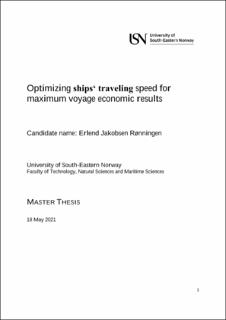| dc.description.abstract | Ship fuel is the single largest budget cost on a voyage. While bunker prices and freight rates are determined by the marked and macroeconomic conditions (e.g., trade, toll barriers), there seems to be an untapped potential by actively adjusting ship speed to improve voyage economic results. This study explores the relationship between ship fuel oil consumption, ships speed and the voyage economic results for a commercial operator in the chemical parcel tanker market. Calculations on 4 different ship classes were performed using a quantitative model. The model illustrates potential bunker cost savings versus revenue win or loss, using scenario and sensitivity analysis. The results show a negative effect on the voyage economic results, by increasing ships speed from budget speed. The results also show a negative effect by traveling with low ship speeds, as the revenue loss for the lost trading days would be greater than the bunker cost savings for the commercial operator. The thesis furthermore discusses how adjusting ships speed could lead to changes in the market, using prisoner ́s dilemma as framework. The dilemma shows that each player ́s dominant strategy would be to increase ships speed. Possibly leading to an overcapacity on the market. | |
